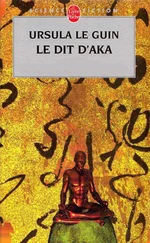There are still many tribal societies on the Frinthian plane, and the Mills researchers visited several. They reported that among these peoples, strong minds are regarded as seers or shamans, with the usual perquisites and penalties of such eminence. If during a famine the tribe’s strong mind dreams of traveling clear down the river and feasting by the sea, the whole tribe may share the vision of the journey and the feast so vividly, with such conviction, that they decide to pack up and start downriver. If they find food along the way, or shellfish and edible seaweeds on the beach, their strong mind gets rewarded with the choice bits; but if they find nothing or run into trouble with other tribes, the seer, now called “the twisted mind,” may be beaten or driven out.
The elders told the researchers that tribal councils usually follow the guidance of dream only if other indications favor it. The strong minds themselves urge caution. A seer among the Eastern Zhud-Byu told the researchers, “This is what I say to my people: Some dreams tell us what we wish to believe. Some dreams tell us what we fear. Some dreams are of what we know though we may not know we know it. The rarest dream is the dream that tells us what we have not known.”
Frinthia has been open to other planes for over a century, but the rural scenery and quiet lifestyle have brought no great influx of visitors. Many tourists avoid the plane under the impression that the Frin are a race of “mindsuckers” and “psychovoyeurs.”
Most Frin are still farmers, villagers, or town dwellers, but the cities and their material technologies are growing fast. Though technologies and techniques can be imported only with the permission of the All-Frin government, requests for such permission by Frinthian companies and individuals have become increasingly frequent. Many Frin welcome this growth of urbanism and materialism, justifying it as the result of the interpretation of dreams received by their strong minds from visitors from other planes. “People came here with strange dreams,” says the historian Tubar of Kaps, himself a strong mind. “Our strongest minds joined in them, and joined us with them. So we all began to see things we had never dreamed of. Vast gatherings of people, cybernets, ice cream, much commerce, many pleasant belongings and useful artifacts. ’Shall these remain only dreams?’ we said. ’Shall we not bring these things into wakeful being?’ So we have done that.”
Other thinkers take a more dubious attitude towards alien hypnogogia. What troubles them most is that the dreaming is not reciprocal. For though a strong mind can share the dreams of an alien visitor and “broadcast” them to other Frin, nobody from another plane has been capable of sharing the dreams of the Frin. We cannot enter their nightly festival of fantasies. We are not on their wavelength.
The investigators from Mills hoped to be able to reveal the mechanism by which communal dreaming is effected, but they failed, as Frinthian scientists have also failed, so far. “Telepathy,” much hyped in the literature of the interplanary travel agents, is a label, not an explanation. Researchers have established that the genetic programming of all Frinthian mammals includes the capacity for dream sharing, but its operation, though clearly linked to the brain-wave synchrony of sleepers, remains obscure. Visiting foreigners do not synchronise; they do not participate in that nightly ghost chorus of electric impulses dancing to the same beat. But unwittingly, unwillingly— like a deaf child shouting—they send out their own dreams to the strong minds asleep nearby. And to many of the Frin, this seems not so much a sharing as a pollution or infection.
“The purpose of our dreams,” says the philosopher Sorrdja of Farfrit, a strong dreamer of the ancient Deyu Retreat, “is to enlarge our souls by letting us imagine all that can be imagined: to release us from the tyranny and bigotry of the individual self by letting us feel the fears, desires, and delights of every mind in every living body near us.” The duty of the strong-minded person, she holds, is to strengthen dreams, to focus them—not with a view to practical results or new inventions but as a means of understanding the world through a myriad of experiences and sentiences (not only human). The dreams of the greatest dreamers may offer to those who share them a glimpse of an order underlying all the chaotic stimuli, responses, acts, words, intentions, and imaginings of daily and nightly existence.
“In the day we are apart,” she says. “In the night we are together. We should follow our own dreams, not those of strangers who cannot join us in the dark. With such people we can talk; we can learn from them and teach them. We should do so, for that is the way of the daylight. But the way of the night is different. We go together then, apart from them. The dream we dream is our road through the night. They know our day, but not our night, nor the ways we go there. Only we can find our own way, showing one another, following the lantern of the strong mind, following our dreams in darkness.”
The resemblance of Sorrdja’s phrase “road through the night” to Freud’s “royal road to the unconscious” is interesting but, I believe, superficial. Visitors from my plane have discussed psychological theory with the Frin, but neither Freud’s nor Jung’s views of dream are of much interest to them. The Frinthian “royal road” is trodden not by one secret soul but by a multitude. Repressed feelings, however distorted, disguised, and symbolic, are the common property of everybody in one’s household and neighborhood. The Frinthian unconscious, collective or individual, is not a dark wellspring buried deep under years of evasions and denials, but a kind of great moonlit lake to whose shores everybody comes to swim together naked every night.
And so the interpretation of dreams is not, among the Frin, a means of self-revelation, of private psychic inquiry and readjustment. It is not even species-specific, since animals share the dreams, though only the Frin can talk about them.
For them, dream is a communion of all the sentient creatures in the world. It puts the notion of self deeply into question. I can imagine only that for them to fall asleep is to abandon the self utterly, to enter or reenter the limitless community of being, almost as death is for us.
HEGN IS A SMALL, COZY PLANE, blessed with a marvelous climate and a vegetation so rich that lunch or dinner there consists of reaching up to a tree to pluck a succulent, sun-warmed, ripe, rare steakfruit, or sitting down under a llumbush and letting the buttery morsels drop onto one’s lap or straight into one’s mouth. And then for dessert there are the sorbice blossoms, tart, sweet, and crunchy.
Four or five centuries ago the Hegnish were evidently an enterprising, stirring lot, who built good roads, fine cities, noble country houses and palaces, all surrounded by literally delicious gardens. Then they entered a settling-down phase, and at present they simply live in their beautiful houses. They have hobbies, pursued with tranquil obsession. Some take up the cultivation and breeding of ever finer varieties of grape. (The Hegnian grape is self-fermenting; a small cluster of them has the taste, scent, and effect of a split of Veuve Clicquot. Left longer on the vine, the grapes reach 80 or 90 proof, and the taste comes to resemble single-malt whiskey.) Some raise pet gorkis, an amiable, short-legged domestic animal; others embroider pretty hangings for the churches; many take their pleasure in sports. They all enjoy social gatherings.
People dress nicely for these parties. They eat a few grapes, dance a little, and talk. Conversation is desultory and, some would say, vapid. It concerns the kind and quality of the grapes, discussed with much technicality; the weather, which is usually settled fair but can always be threatening, or have threatened, to rain; and sports, particularly the characteristically Hegnish game of sutpot, which requires a playing field of several acres and involves two teams, many rules, a large ball, several small holes in the ground, a movable fence, a short, flat bat, two vaulting poles, four umpires, and several days. No non-Hegnish person has ever been able to understand sutpot. Hegnishmen discuss the last match played, with the same grave deliberation and relentless attention to detail with which they played it. Other subjects of conversation are the behavior of pet gorkis and the decoration of the local church. Religion and politics are never discussed. It may be that they do not exist, having been reduced to a succession of purely formal events and observances, while their place is filled by the central element, the focus and foundation of Hegnish society, which is best described as the Degree of Consanguinity.
Читать дальше









